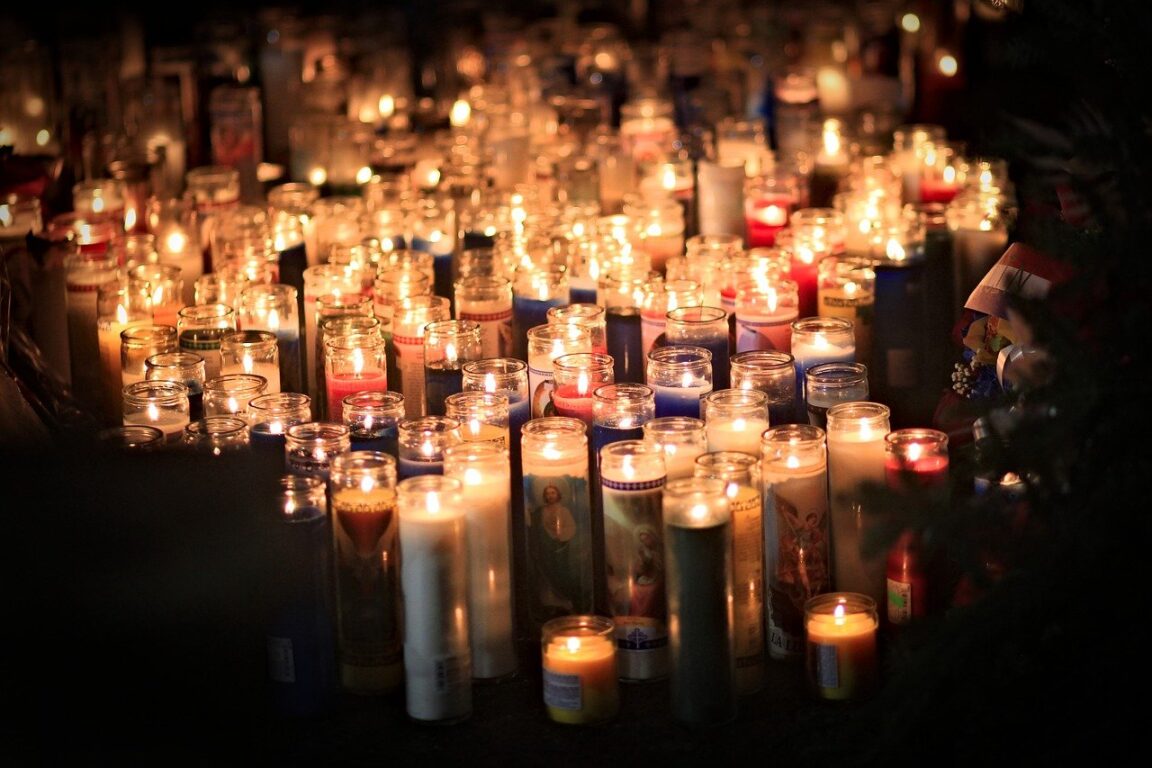This post may include affiliate links to products we think you'll find useful. We may earn a small commission if you buy through these links. Read our affiliate disclosure.
If you have ever lost a loved one, you know the pain that comes with it. The emptiness. The feeling of being lost yourself.
It can be hard to express those feelings in words, but these poems do an incredible job of capturing the sorrow and heartache of losing someone close to you.
These poems about death and loss will make you feel understood, help you remember, and maybe even help you find some closure.
A Song of Living
Amelia Josephine Burr, American poet, 1878 – 1968
A song of living is about living a life full of love, friendship and accomplishment that leaves you with no regrets at the end of your time.
Because I have loved life, I shall have no sorrow to die.
I have sent up my gladness on wings, to be lost in the blue of the sky.
I have run and leaped with the rain, I have taken the wind to my breast.
My cheeks like a drowsy child to the face of the earth I have pressed.
Because I have loved life, I shall have no sorrow to die.
I have kissed young love on the lips, I have heard his song to the end,
I have struck my hand like a seal in the loyal hand of a friend.
I have known the peace of heaven, the comfort of work done well.
I have longed for death in the darkness and risen alive out of hell.
Because I have loved life, I shall have no sorrow to die.
I gave a share of my soul to the world, when and where my course is run.
I know that another shall finish the task I surely must leave undone.
I know that no flower, nor flint was in vain on the path I trod.
As one looks on a face through a window, through life I have looked on God,
Because I have loved life, I shall have no sorrow to die.
Turn Again To Life
Mary Lee Hall, American lawyer, 1843 – 1927
Turn again to life is about dealing with the grief of a lost loved one and embracing the joy of life again.
If I should die and leave you here a while,
be not like others sore undone,
who keep long vigil by the silent dust.
For my sake turn again to life and smile,
nerving thy heart and trembling hand
to do something to comfort other hearts than mine.
Complete these dear unfinished tasks of mine
and I perchance may therein comfort you.
Inside Our Dreams
Jeanne Willis, English author, 1959 – Present
Inside our dreams is a whimsical passage that reminds us that the people we have loved and lost will always remain in our dreams and memories.
Where do people go to when they die?
Somewhere down below or in the sky?
‘I can’t be sure,’ said Grandad, ‘but it seems
They simply set up home inside our dreams.’
Peace My Heart
Rabindranath Tagore, Indian poet, 1861 – 1941
Peace my heart uses vivid images of animals and nature to describe the natural process of death. It’s a gentle reminder that death isn’t something to be feared.
Peace, my heart, let the time for the parting be sweet.
Let it not be a death but completeness.
Let love melt into memory and pain into songs.
Let the flight through the sky end in the folding of the wings over the nest.
Let the last touch of your hands be gentle like the flower of the night.
Stand still, O Beautiful End, for a moment, and say your last words in silence.
I bow to you and hold up my lamp to light your way.
Death Is Nothing at All
Harry Scott-Holland, English academic, 1847 – 1918
The 6 stanzas of ‘Death is nothing at all’ suggests that everything will stay the same after you die. It’s a poem designed to bring a lot of comfort to those who believe in the afterlife.
Death is nothing at all.
It does not count.
I have only slipped away into the next room.
Nothing has happened.
Everything remains exactly as it was.
I am I, and you are you,
and the old life that we lived so fondly together is untouched, unchanged.
Whatever we were to each other, that we are still.
Call me by the old familiar name.
Speak of me in the easy way which you always used.
Put no difference into your tone.
Wear no forced air of solemnity or sorrow.
Laugh as we always laughed at the little jokes that we enjoyed together.
Play, smile, think of me, pray for me.
Let my name be ever the household word that it always was.
Let it be spoken without an effort, without the ghost of a shadow upon it.
Life means all that it ever meant.
It is the same as it ever was.
There is absolute and unbroken continuity.
What is this death but a negligible accident?
Why should I be out of mind because I am out of sight?
I am but waiting for you, for an interval,
somewhere very near,
just round the corner.
All is well.
Nothing is hurt; nothing is lost.
One brief moment and all will be as it was before.
How we shall laugh at the trouble of parting when we meet again!
You’ll Never Walk Alone
Oscar Hammerstein II, American theater producer, 1895 – 1960
You’ll never walk alone is a powerful song designed to bring comfort to anyone facing an uphill battle. It’s often used as an anthem to support those who have died in tragic circumstances.
When you walk through the storm
Hold your head up high,
And don’t be afraid of the dark.
At the end of the storm
Is a golden sky
And the sweet silver song of a lark.
Walk on through the wind,
Walk on through the rain,
Though your dreams be tossed and blown.
Walk on, walk on with hope in your heart
And you’ll never walk alone.
You’ll never walk alone.
When I’m Gone
Mosiah Lyman Hancock, American religious figure, 1843 – 1907
This wonderful poem is about celebrating all the achievements and positivity that the deceased brought into the world. It also hopes that we’ll forgive them for the mistakes they made.
When I come to the end of my journey
And I travel my last weary mile
Just forget if you can, that I ever frowned
And remember only the smile
Forget unkind words I have spoken
Remember some good I have done
Forget that I ever had heartache
And remember I’ve had loads of fun
Forget that I’ve stumbled and blundered
And sometimes fell by the way
Remember I have fought some hard battles
And won, ere the close of the day
Then forget to grieve for my going
I would not have you sad for a day
But in summer just gather some flowers
And remember the place where I lay
And come in the shade of evening
When the sun paints the sky in the west
Stand for a few moments beside me
And remember only my best
Farewell
Anne Bronte, English poet, 1820 – 1849
This poem is about saying farewell to someone you’ve lost and promising to always keep them alive in your thoughts.
Farewell to Thee! But not farewell
To all my fondest thoughts of Thee;
Within my heart they still shall dwell
And they shall cheer and comfort me.
Life seems more sweet that Thou didst live
And men more true Thou wert one;
Nothing is lost that Thou didst give,
Nothing destroyed that Thou hast done.
Crossing The Bar
Alfred Tennyson, English poet, 1809 – 1892
Crossing the bar is about accepting death and hoping for a peaceful transitioning into the afterlife.
Sunset and evening star,
And one clear call for me!
And may there be no moaning of the bar,
When I put out to sea,
But such a tide as moving seems asleep,
Too full for sound and foam,
When that which drew from out the boundless deep
Turns again home.
Twilight and evening bell,
And after that the dark!
And may there be no sadness of farewell,
When I embark;
For tho’ from out our bourne of Time and Place
The flood may bear me far,
I hope to see my Pilot face to face
When I have crost the bar.
There Is No Night Without A Dawning
Helen Steiner Rice, American writer, 1900 – 1981
There is no light is about moving past the grief of losing a loved one an taking comfort in the idea that they are at peace.
There is no night without a dawning
No winter without a spring
And beyond the dark horizon
Our hearts will once more sing…
For those who leave us for a while
Have only gone away
Out of a restless, care worn world
Into a brighter day.
A Parting Guest
James Whitcomb Riley, American author, 1849 – 1916
A parting guest is about experiencing a life of joy and love and being satisfied when your time to pass finally comes.
What delightful guests are they
Life and Love!
Lingering I turn away,
This late hour, yet glad enough
They have not witheld from me
Their high hospitality.
So with face lit with delight
And all gratitude, I stay
Yet to press their hands and say,
“Thanks. So fine a time! Goodnight.
I Will Love Death
Chinmoy Kumar Ghose, Indian religious figure, 1931 – 2007
This powerful death poem speaks to the idea that death is also God’s creation and you will live on in the afterlife when you die.
I know I will love death.
Why?
Because death too
Is God’s creation
And because death reminds me
Of the existence of her sister:
Infinity’s Life immortal.
I Fall Asleep
Samuel Butler, English writer, 1835 – 1902
This passage comes from Butler’s novel Erehon Revisited (1901). It suggests that there is no afterlife, but the dead will remain alive in the thoughts and deeds of those they loved.
I fall asleep in the full and certain hope
That my slumber shall not be broken;
And that though I be all-forgetting,
Yet shall I not be forgotten,
But continue that life in the thoughts and deeds
of those I loved.
Sonnet 71
William Shakespeare, English playwright, 1564 – 1616
Sonnet 71 is about the inescapable reality of aging and eventual death. It’s a reminder not too mourn someone you’ve lost for too long and move on with your life.
No longer mourn for me when I am dead
Then you shall hear the surly sullen bell
Give warning to the world that I am fled
From this vile world, with vilest worms to dwell:
Nay, if you read this line, remember not
The hand that writ it; for I love you so
That I in your sweet thoughts would be forgot
If thinking on me then should make you woe.
O, if, I say, you look upon this verse
When I perhaps compounded am with clay,
Do not so much as my poor name rehearse.
But let your love even with my life decay,
Lest the wise world should look into your moan
And mock you with me after I am gone.
The Letter
Thomas Bailey Aldrich, American writer, 1836 – 1907
The letter is a truly amazing poem that talks about how the deceased can continue to speak to the living and teach them through the words they leave behind.
I held his letter in my hand,
And even while I read
The lightning flashed across the land
The word that he was dead.
How strange it seemed! His living voice
Was speaking from the page
Those courteous phrases, tersely choice,
Light-hearted, witty, sage.
I wondered what it was that died!
The man himself was here,
His modesty, his scholar’s pride,
His soul serene and clear.
These neither death nor time shall dim,
Still this sad thing must be–
Henceforth I may not speak to him,
Though he can speak to me!
The Bustle in a House
Emily Dickinson, American poet, 1830 – 1886
The bustle in a house is a sad and poignant reminder of the emotional work required to recover and move on with life after losing someone you love.
The bustle in a house
The morning after death
Is solemnest of industries
Enacted upon earth.
The sweeping up the heart
And putting love away
We shall not want to use again
Until eternity.
If I Should Go
Joyce Grenfell, English singer, 1910 – 1979
This wonderful poem brings tears to my eyes. It’s a reminder to keep on living and embracing life after you lose a loved one.
If I should go before the rest of you
Break not a flower nor inscribe a stone
Nor when I’m gone speak in a Sunday voice
But be the usual selves that I have known
Weep if you must
Parting is hell
But life goes on
So sing as well.
Do Not Stand At My Grave And Weep
Mary Elizabeth Frye, American poet, 1905 – 2004
This poem brings comfort to those mourning a loved one by suggesting that death isn’t the end and the spirit lives on all around us in nature.
Do not stand at my grave and weep
I am not there; I do not sleep.
I am a thousand winds that blow,
I am the diamond glints on snow,
I am the sun on ripened grain,
I am the gentle autumn rain.
When you awaken in the morning’s hush
I am the swift uplifting rush
Of quiet birds in circled flight.
I am the soft stars that shine at night.
Do not stand at my grave and cry,
I am not there; I did not die.
Gone From My Sight
Henry Van Dyke, American author, 1852 – 1933
Gone from sight is a beautiful metaphor for losing someone you love and believing they will transition to the next life. They may be gone form your sight, but someone else is waiting for them on the other side.
I am standing upon the seashore. A ship, at my side,
spreads her white sails to the moving breeze and starts
for the blue ocean. She is an object of beauty and strength.
I stand and watch her until, at length, she hangs like a speck
of white cloud just where the sea and sky come to mingle with each other.
Then, someone at my side says, “There, she is gone.”
Gone where?
Gone from my sight. That is all. She is just as large in mast,
hull and spar as she was when she left my side.
And, she is just as able to bear her load of living freight to her destined port.
Her diminished size is in me — not in her.
And, just at the moment when someone says, “There, she is gone,”
there are other eyes watching her coming, and other voices
ready to take up the glad shout, “Here she comes!”
And that is dying…
You may also enjoy:
Why am I so unhappy? 24 reasons (and how to change)
13 reasons you feel like you don’t belong anywhere



